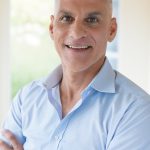Fixing Your Broken Brain + Lots More:
10 Takeaways from My Most-Asked Questions

I recently had the honor to answer some of my patients’ health questions, many of which inquired about various aspects of having a broken brain.
One wondered whether someone with moderately severe Alzheimer’s would be okay eating ice cream if he’s doing everything else correctly. Another asked how Functional Medicine, which looks at the whole person rather than the disease, could help addiction.
In addition to these astute questions, I address things like Parkinson’s disease and the gut-brain connection, as well as how high blood pressure could contribute to brain disorders like dementia.While most questions related to brain health, others focused on whether a ketogenic diet would be okay after you’ve had your gallbladder removed.
I even discuss how Americans often spend the most on healthcare but have the most chronic disease.
For many of these issues, my Functional Medicine approach encompasses things like diet, nutrient deficiencies, exercise, stress management, sleep, and overall quality of life. It provides a more comprehensive, effective approach that addresses the root of the issue rather than looking for an easy answer.
Based on these patient questions, I’ve compiled 10 takeaways that I believe will empower you to take control over your health issues, whether you’ve got a loved one with Alzheimer’s or are curious about the ketogenic diet.
- Functional medicine is the foundation to transform healthcare. Functional Medicine finds the root cause or causes of your issue, addressing the whole person rather than just putting a label on the condition. This approach requires more time than simply writing a prescription or sending someone to a specialist for further diagnosis, but I truly believe it provides the correct approach to remedy any health problem.
- Eating a ketogenic diet is neuroprotective. A ketogenic diet—about 75 percent fat, 20 percent protein, and five percent carbohydrate—is a great way to stabilize blood sugar, reducing your risk of disease and helping you lose weight. It also makes a great diet for brain health. I’ve found a ketogenic diet can prevent or reverse disorders such as Alzheimer’s, Parkinson’s, and depression.
- The best medicine is on your fork. Nourishing foods like omega-3 rich wild-caught fish, healthy fats like avocado, clean sources of protein, and tons of phytonutrient-rich veggies belong on your plate at every meal. Beyond those foods, I like health-boosting ingredients like ginger, apple cider vinegar, sour foods like lemon and citrus fruits, and fermented vegetables to enhance your gut microbiome.
- Nutrient deficiencies can exacerbate disorders. Deficiencies in nutrients like vitamin D and vitamin B12 can adversely impact brain health. At the very least, I recommend a good multivitamin/mineral, fish oil, and (especially if you’re not eating fermented foods) a probiotic supplement. Beyond that, I address nutrients for specific conditions including antioxidants like curcumin and coenzyme Q10. I recommend speaking with a Functional Medicine practitioner to address specific nutrients for your condition.
- Gut health plays more of a role in overall health than you might imagine. To heal a broken brain, the first place to start is your gut. Consider that your gut produces about 40 neurotransmitters, including dopamine and serotonin that impact cognition, mood, and other brain-health factors. Leaky gut and other gut issues can increase inflammation, autoimmunity, and diseases like Alzheimer’s and Parkinson’s. People with Parkinson’s are also 25 – 50 percent more likely to have small intestinal bacterial overgrowth (SIBO). You get my point: To fix your brain, start with your gut.
- The conditions of many diseases overlap. The labels might be different, but many problems have very similar origins. I make similar recommendations for different conditions because stress management, optimal sleep levels, exercise, and diet play a significant role to alleviate many of these conditions. For instance, I often talk about Alzheimer’s and Parkinson’s interchangeably. That’s because disrupted glucose metabolism, inflammatory markers, toxicity, oxidation, and gut issues like leaky gut from bacterial imbalances, contribute to both brain disorders.
- How you live matters too. You might be eating the highest-quality diet in the world, but if you’re not exercising, managing stress, sleeping soundly, and challenging your brain with new activities regularly, you’re not going to gain all the benefits of better brain and overall health. Your diet matters, but so do lifestyle factors.
- Your genes are not your destiny. With addiction, I talk about how almost a third of us carry a defective gene that lowers dopamine levels. Things that stimulate dopamine (like alcohol or gambling) can especially become habitual for those people. Genetics are hardwired, but they don’t determine our outcome. Dietary and lifestyle factors can go a long way to create a successful outcome for these problems.
- Broken brains don’t just happen to older people. A strong link exists between high blood pressure and many diseases including Alzheimer’s. This doesn’t just happen to elderly people. Hypertension in your 30s and 40s has the same effect on your brain, shortchanging blood flow to this vital organ that can contribute to many neurodegenerative diseases.
- Staying hydrated matters more than you might think. Staying hydrated is crucial to supporting stomach acid levels if you’ve had your gallbladder removed, but optimal hydration can benefit many other health conditions as well. Being under-hydrated can manifest in various conditions including hunger and skin problems. To optimize hydration, drink about 32 ounces of water upon waking and then another 32 ounces throughout the day. To optimize digestion, avoid drinking water 30 minutes before or after meals. Otherwise, drink up!
Whatever your conditions, these 10 takeaways provide a powerful foundation to cultivate the healthiest, happiest version of you in 2018.

